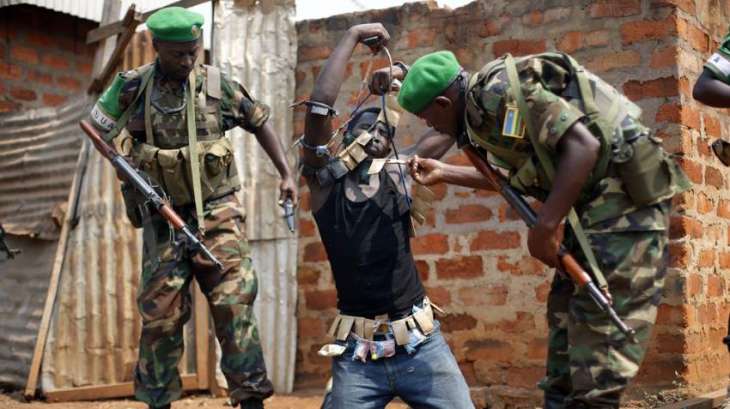The authorities and armed groups of the Central African Republic (CAR) initialed on Tuesday a peace agreement at the talks in Khartoum
MOSCOW (Pakistan Point News / Sputnik - 05th February, 2019) The authorities and armed groups of the Central African Republic (CAR) initialed on Tuesday a peace agreement at the talks in Khartoum.The car is located in the central part of the African continent and is bordered by Chad to the north, Sudan and South Sudan to the east, the Democratic Republic of the Congo and the Republic of the Congo to the south, and Cameroon to the west.
Until 1958, the CAR was a French colony and a part of the French Equatorial Africa called Ubangi-Shari. On December 1, 1958, the country became an autonomous republic within the French Community. The country's independence was proclaimed on August 13, 1960.
In 1976-1979, the country was called the Central African Empire, and its head bore the title of Emperor.
In 2003, Francois Bozize became president of the country.
Armed conflicts were breaking out in the country, mainly between members of the Christian and Muslim communities, with varying intensity. They reached a high point in the end of 2012, when clashes between the Christian Anti-balaka militia and the mainly Muslim armed group Seleka spread over almost the entire territory of the CAR.
In January 2013, under the auspices of the Economic Community of Central African States (ECCAS), the Libreville agreements on a ceasefire and a political process were signed between the government of the Central African Republic, the democratic opposition, and Seleka. In March 2013, Seleka rebels resumed hostilities. President Bozize fled the country.
On March 25, 2013, Seleka leader Michel Djotodia declared himself the head of state. In August 2013, he was officially sworn in as president of the transitional government.
The African Union condemned the military coup in the CAR. Djotodia's actions were not approved at the subregional level either. The emergency summit of the EGCAA, held on January 9-10, 2014, prompted the Seleka leader to step down as interim president. Djotodia left the country and went to Benin.
On January 20, 2014, Catherine Samba-Panza became the new head of state.
On April 10, 2014, the United Nations Security Council established the UN Multidimensional Integrated Stabilization Mission in the Central African Republic (MINUSCA). The French military contingent has been operating in the country since December 2013, as part of Operation Sangaris, and in April 2016, the Council of the European Union established EU Military Training Mission in the Central African Republic (EUTM RCA).
The consolidated efforts of the international community contributed to the development of the political process in the country. The Forum for National Reconciliation took place in Bangui on May 4-11, 2015. Its main outcome was the end of the transitional period and the organization of a presidential election.
On February 14, 2016, former Prime Minister Faustin-Archange Touadera was elected new president of the CAR.
On June 19, 2017, with the mediation of the Roman Catholic Community of Sant'Egidio, the CAR government signed a truce deal with armed groups in the Italian capital of Rome. The deal stipulated commitment of militants to cease fire, lift restrictions on freedom of movement of people and goods, release illegally detained persons, and recognize the legitimate authorities, formed on the basis of the 2015-2016 elections. The government, on its part, pledged to take into account the interests of armed groups in everything that concerned their participation in the disarmament, demobilization, reintegration and repatriation (DDR/R), security sector reform (SSR), justice and reconciliation, and to recognize them as full participants in the reconstruction of the country.
In 2017-2018, tensions between numerous armed groups in the CAR persisted, and violent clashes occurred in several areas of the country. Nearly 70 percent of the country's territory was controlled by armed groups. Militants controlled mining of natural resources, such as gold and diamonds, and were engaged in illegal taxation of mineral traders and cattlemen. The war in the Central African Republic turned into a protracted humanitarian crisis.
According to the UN, as of the end of July 2018, up to a million people were forced to leave their homes and about 6,000 people were killed during the conflict.
Direct negotiations under Russia's mediation on steps toward solving the conflict between the leaders of the CAR largest armed groups, including organizations that had previously been members of Seleka and Anti-balaka, were held in Sudan's Khartoum on August 27-28, 2018.
Seleka and Anti-balaka signed a declaration of understanding and announced the creation of the Central African opposition alliance in order to achieve a lasting and stable peace in the republic. The document contained a commitment to ensure free and safe movement of representatives of humanitarian and non-profit organizations across the country, commitment to the African Union's initiative on establishing peace and security in the CAR, and readiness to start the peace process with the central government.
On 24 January 2019, direct talks between the CAR government and armed groups started in Khartoum.
On February 2, 2019, it became known that representatives of the government and opposition groups reached a peace agreement during their talks. In particular, the CAR authorities and armed groups agreed to establish a mixed border security mechanism between the CAR government, the UN troops and representatives of the armed groups. It was also decided to set up a special commission that would be tasked with accounting all the crimes committed in the country since 2013.




